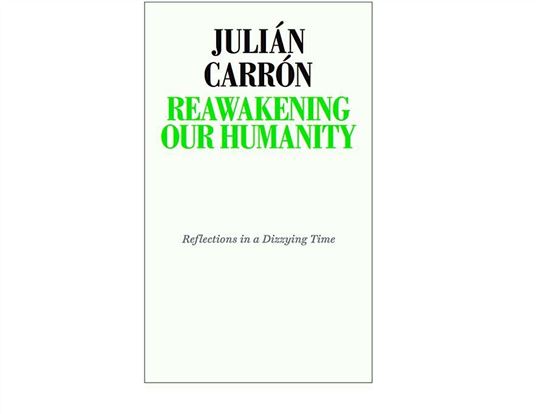
The bubble and a different logic
A group of ambassadors to the Holy See asked Julián Carrón to discuss the themes of Reawakening Our Humanity with them. A rich and profound conversation. We spoke about it with the Ecuadorian representative José Luis Álvarez Palacio."After hearing about the launch of Julián Carrón's book, the "Group" decided to invite the author. We thus had the opportunity to learn more about the great work that Communion and Liberation does", explains Ecuador's ambassador to the Vatican, José Luis Álvarez Palacio, speaking about the book-interview Reawakening Our Humanity. Reflections in a dizzying time, and the discussion that followed with the president of the Fraternity. The meeting took place on May 29, as part of the program of events that Grulac (Group of Latin American and Caribbean Ambassadors to the Holy See) held during these months of the pandemic, focused upon dialogue with the Vatican authorities and leaders of religious or lay organizations linked to the Holy See. A conversation made up of questions as "worthy" and inexhaustible as they are pertinent to the life of each of us, and capable of changing one's gaze.
The bewilderment that we all felt at the beginning of the pandemic revealed a great need for authority: in a positive, etymological sense, from the Latin augeo, "increase". We need to look to those who are able to "increase" our experience of things, and for this reason help us to build a new security.
During the pandemic, the majority of the world's population turned their gaze towards their leaders: political, spiritual or social. Humanity needs truth and transparency, above all. This situation also showed that we need to re-establish mutual trust, which allows us to face and overcome the obstacles that life places in our way. We must strengthen our humanity and reflect on the fragility of life. There is no doubt that humanity has taken many things for granted: the feeling that everything is under control vanished within a few days. It was a "call" to humility, but also a call to appreciate the most essential thing we have: life. Life in values, in solidarity, in harmony with nature and in spirituality. This is the reawakening that the pandemic has produced.
What have we learned from the emotional and existential "blend" of fear of contagion and social distancing?
As Pope Francis said, we must create the future, design it. This pandemic has not only reawakened us, but has also made us reflect upon our mission on earth. It has made us understand that we are all in the same boat, and that it makes no sense to row in opposite directions. It is true that in isolation we were able to appreciate much of what we had lost because of the frenetic dynamics of the modern, globalized world. The new normality will limit us in many things we were accustomed to, but, on the other hand, it gives us the possibility to enjoy the most elementary and simple things, such as the unity of the family, the dialogue and the encounter with others, and the most important thing: to recognize that we were all created equal. As Fr. Carrón says in his book: reality has always been there, but we did not see it. It irrupted in a very noisy way, like a tidal wave or a volcanic explosion, and the fiction that the human being projected onto reality cracked - to describe it with a concrete image - the mirror in which we looked at ourselves. And the map that guided us, perhaps, has changed forever. Our paradigms will have to be rethought. We have hard work ahead of us.
To make that need to understand that we call reason re-emerge in all its magnitude.
This is another very interesting subject that Fr. Carrón raises: the relationship with ourselves. If this crisis has taken us out of our "comfort zones". The most difficult thing is that which confronts us with our ego, with our masks and, therefore, with our deepest fears. What demanding exercise it makes us do! Will power must be exercised so that, seeing ourselves, we can reinvent ourselves and continue to navigate with more human and supportive meaning. In the twentieth century, humanity has taken a big step forwards in development, but particularly in the last twenty-five years, technology has made the planet a much flatter and more interconnected place; resources have begun to circulate at a greater speed, probably generating false references and altering social and economic order. We are left alone in that imaginary bubble that we ourselves have created. The virus, like an invisible needle, made it explode and found us puzzled by reality. It is not a bad thing that a pandemic has given us a lesson in reality and a refreshing bath of sincerity, in an ecological and social, human and even spiritual dimension.
Read also - "Confront my questions, without fear"
Can a tragic event such as the pandemic be an opportunity to restart positively?
We must redirect life by creating and taking charge of our future. Without a doubt, we must awaken to a new normality changed from within, so that we can improve the world and correct the course of history: we can do it together, rowing in the same direction, caring for each other and leaving no one behind. Faith is the solid rock to which Ecuador has turned its gaze at this moment: a living force, a solid foundation of our identity and an opportunity to meet again in solidarity and trust. The sudden irruption of reality in our lives has shown us the fragility of the human being. It showed us that neither money nor power makes us different. It made us reflect on how we are equal and upon the fact that we were created as "interdependent". We must leave the logic of "yours or mine behind". And begin to assume another: "yours and mine".#ReawakeningOurHumanity